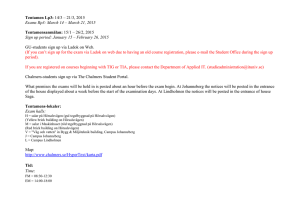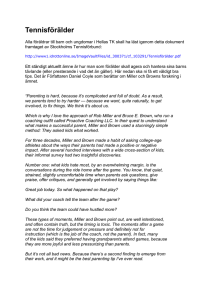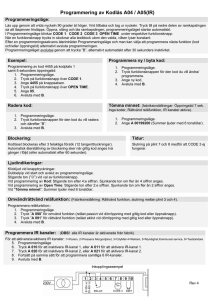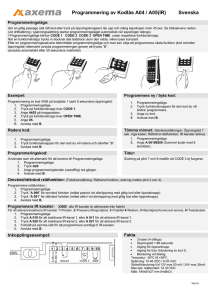Introduktion till vetenskaplig metodik Johan Åberg
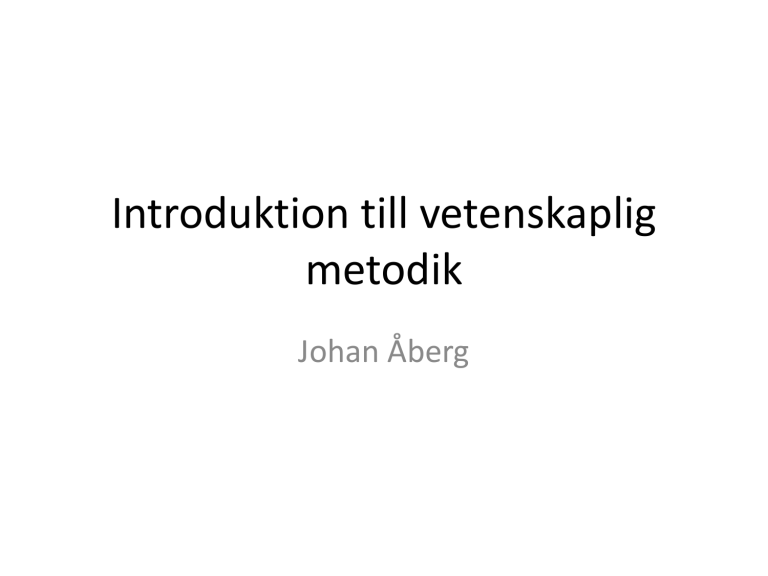
Introduktion till vetenskaplig metodik
Johan Åberg
Innehåll
• Forskarvärlden
• Viktiga begrepp
• Referenshantering
• Den vetenskapliga rapporten
• Vetenskaplig diskussion
Forskarvärlden
• Forskare mäts i antal publikationer och antal citeringar
• Publikationer
– Tidskrifter
– Konferenser
– Workshops
• Referee-granskning
• Olika publikationer har olika status
Call for papers (cfp)
Journal citation index
• Databaser
– IEEE
• IEEE explore
– ACM
• ACM DL
– Springer
• Springer Link
• bibl.liu.se
Litteratursökning
• Google scholar
– Vilka andra artiklar har citerat den här artikeln?
– Funktionen ”Cite”
Vetenskapliga kvalitetsbegrepp
• Validitet
– Mäter man det man vill mäta?
• Reliabilitet
– Tillförlitlighet
• skulle man få samma resultat om man mätte igen, oberoende av vem som skötte mätningen?
• Replikerbarhet
– Är en studie så väl beskriven och någon kan göra om samma studie?
Metodperspektiv
• Kvalitativ
– Kvalitativ data
• Tal, text
– Fokus
• Förstå, se olika perspektiv
– Datainsamling
• Intervju
• Fritextsvar i enkät
– Analys
• Kategoriseringsmetoder,
…
• Kvantitativ
– Kvantitativ data
• Siffror
– Fokus
• Kvantifiera, jämföra
– Datainsamling
• Mätning med instrument
• Flervalsalternativ
– Analys
• Statistiska metoder
Referenshantering
• Tidskrift
– Nosek, J. T. (1998). The case for collaborative programming.
Communications of the
ACM , 41 (3), pp. 105-108.
• Konferens
– Plonka, L., Sharp, H., & van der Linden, J. (2012). Disengagement in pair programming: does it matter? In Proceedings of the 34 th International Conference on Software
Engineering (ICSE), pp. 496-506. IEEE.
• Workshop
– Samma som för konferens
• Avhandling/uppsats
– Furulund, M.K. (2007). Empirical Research on Software Effort Estimation Accuracy ,
Master Thesis, Department of Informatics, University of Oslo.
• Bok
– Ford, N. (2008).
The productive programmer . O'Reilly Media, Inc.
Referenshantering – olika format
Den vetenskapliga rapporten
• Abstract
– Kort och koncist, inklusive resultat och slutsatser
• Inledning
– Väck intresse och motivera
– Tydliga frågeställningar
• Teori
– Beskriv relaterad forskning
– Tematiskt, inte per författare
• Metod
– Detaljerad beskrivning av studien
• tänk på replikerbarhet
– Datainsamling och analys
• Resultat
– Presentera resultatet
– Sakligt, utan analys eller kommentar
• Diskussion
– Hur kan resultaten tolkas?
– Koppling till relaterad forskning
(teorikapitlet)?
– Metodmässiga risker eller begränsningar?
• Slutsatser
– Återkoppla till forskningsfrågorna
– Vad blev svaret?
• Referenser
– Lista källorna enligt passande format
Vetenskaplig diskussion
• Liknande resultat
– “The strong tendency of navigators to suggest specifications (i.e., what to click or scroll) to the driver is a testament to how closely partners worked together. Chong et al. [7] also observed pairs (professionals) working very closely together—so close that the partners were practically finishing each other’s sentences. Similar to the Chong pairs, our navigators were so engaged in the task and in tune with the context that they made most of their suggestions at the level of what to click next, rather than higher level strategies.”
• Skilda resultat
– “Our navigators’ strong tendency to offer ideas for specific actions contrasts with prior findings about the level of abstraction of navigator discourse. In particular, Bryant et al. [5] studied the utterances of professional pairs and coded them based on five levels of abstraction
(from lowest to highest). Their study found that navigator discourse was predominantly at a moderate level of abstraction, in which the program was discussed in terms of logical chunks and strategies. However, our navigators’ specific-action suggestions were at a lower level of abstraction than logical chunks and strategies.”
Exempel från artikeln: Jones, D.L., and Fleming, S.D. What use is a backseat driver? A qualitative investigation of pair programming. In Proceedings of the IEEE Symposium on Visual Languages and Human-Centric Computing , pp. 103-110, 15-19 September, 2013.
• Varför skilda resultat?
– “This difference may be because we looked only at utterances in which navigators offered ideas, but it may also be because of differences between the Bryant pairs and ours. For example, our pairs may have worked more closely together than the Bryant professional programmers. A study of professional pairs by Plonka et al. [23] found that their navigators often had reason to disengage from the driver’s activity, for example, because of interruptions or because they divided up work to be done in parallel with the driver.
Our navigators generally did not exhibit such disengagement behavior.”
• Alternativ förklaring
– “The difference may also be because the Bryant pairs were professionals who had been pair programming for over 6 months.
Thus, their pairs were likely already jelled, and as such, had developed their pair communication such that they could converse using higher levels of abstraction. In contrast, our pairs may not have developed the common vernacular necessary for easy communication at higher levels of abstraction.”
Exempel från artikeln: Jones, D.L., and Fleming, S.D. What use is a backseat driver? A qualitative investigation of pair programming. In Proceedings of the IEEE Symposium on Visual Languages and Human-Centric Computing , pp. 103-110, 15-19 September, 2013.
